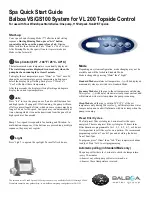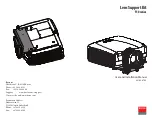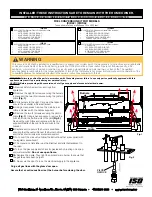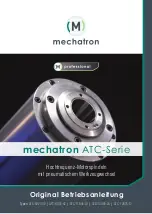
34
NEXUS
®
MODULAR HYBRID COOLER
Corrosion Protection
4
NOTES:
1.
Since the quality of the ambient
air and make-up water varies
significantly from job site to job
site, BAC strongly recommends
obtaining the services of a water
treatment specialist prior to the
initial start-up of the evaporative
cooling equipment. Additionally,
to protect against the risk of
Legionella contamination, never
operate the cooling equipment
without adequate biological
control.
2.
BAC recommends adjusting
the conductivity setpoint in the
iPilot
®
Control System to best
minimize water consumption
and keep heat transfer surfaces
scale-free.
The Nexus
®
Modular Hybrid Cooler can be constructed of a variety of highly corrosion-resistant
materials ranging from Thermosetting Hybrid Polymer Components to all stainless steel.
•
Thermosetting Hybrid Polymer Components:
Inspect the components protected with
the thermosetting hybrid polymer for scratches, scrapes, or blemishes. To cosmetically
touch up these areas with color matched polymer, use BAC Part #160133 available
from your local BAC Representative.
•
Stainless Steel Components
: Inspect stainless steel components for signs of blemishes
or corrosion. See “Long Term Care of Stainless Steel”
page 33
for cleaning and care
instructions.
Other materials are used in the unit, including coated aluminum fan assemblies, plastic
make-up valves, and EPDM grommets, all of which have been selected for corrosion
resistance and long life. Periodically inspect these components for deterioration and
repair or replace as necessary.
Water Treatment
A proper water treatment program, administered under the supervision of a competent water
treatment specialist, is an essential part of routine maintenance to ensure the safe operation
and longevity of evaporative cooling equipment, as well as other system components. In
evaporative cooling products, cooling is accomplished by evaporating a small portion of the
recirculating water as it flows through the unit. As the water evaporates, the dissolved solids
originally present in the water remain behind and if not controlled, the concentration of
dissolved solids will increase rapidly. This can lead to corrosion, scale or biological fouling
which may negatively affect heat transfer as well as the longevity of system components.
•
Corrosion
– Red rust on steel components and white rust may affect the longevity of
system components.
•
Scale Formation
– Scale, typically a calcium or magnesium based build-up, not
only reduces heat transfer and system efficiency, but also may lead to under deposit
corrosion. If scale is not controlled, it may continue building on critical components
such as the heat transfer surfaces and severely impact thermal performance.
•
Biological Fouling
– Slime and algae formations may reduce heat transfer, promote
corrosion, and harbor pathogens such as
Legionella.
Water Treatment Options
Water treatment programs vary based on whether the basin is drained daily or not:
If the basin is drained daily:
• The basin will not refill until there is a need for evaporative cooling, as long as the
ambient dry bulb is greater than or equal to 35° F.
• Given the high dry capacity, the unit may operate for many days before needing to refill
the basin. This allows the basin to dry out and help kill and limit biological growth.
Содержание NEXUS NXF-0403N-CS2TS-H1
Страница 1: ...OPERATION MAINTENANCE MANUAL...
















































